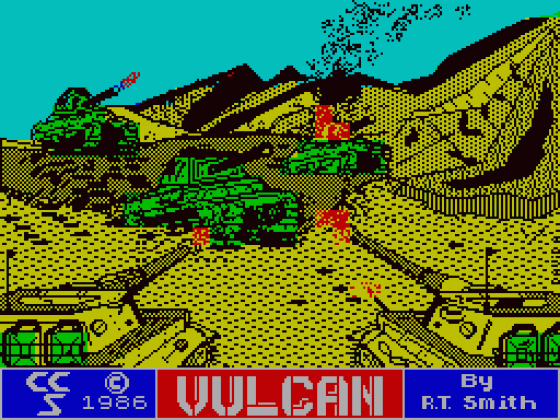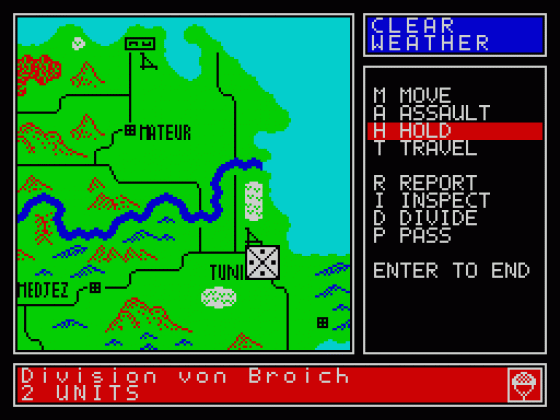Gordon Hamlett reports from the front...
Wargames
The number of wargames available for the home computer has escalated considerably over the last couple of years. There are several reasons why the micro version of a game is succeeding whereas its traditional 'boxed game' counterpart had only limited appeal.
The obvious benefit that a micro offers is that you don't need a second person if you want to play a game. Then, there is no need to set up thousands of cunters on a board or work out combat results from a set of complicated tables. The drudgery is all handled for you. On the debit side, computer wargames are not yet as sophisticated as their original counterparts although the balance is shifting and, as I will point out later, there are certain advantages in playability to be gained on the micro.
Samurai
Three games have appeared for the Spectrum in recent weeks and all three offer the budding strategist something different. The first of these games is Samurai from CRL (£9.95). This is a one player game with three different scenarios and three difficulty levels.

You take the side of a small band of warriors, trying to wipe out an enemy force of assorted temple guards. The game is icon-driven and starts with you selecting your initial forces. You have so many points to 'spend' and each type of warrior costs a varying amount. There are four types to choose from - Ashigari or lightly armoured troops, the traditional Japanese warrior the Samurai, a mounted Samurai and the deadly Ninja.
The mechanics of the game are very simple and are basically move and fight. Ninjas must be carefully managed as they are the only troops who can attack from a distance and should be used very much in hit-and-run tactics.
Samurai is by far the simplest of the three games and will appeal more to the novice. Beware though! To all intents and purposes, Samurai is the same game as Swords Of Bane from CCS and it is probably not worth gettng both.
Battle Of Britain
Moving forward a few hundred years brings us to 1940 and PSS's Battle Of Britain (£8.95). Hitlet had commaneded Goering, his head of the Luftwaffe, to destroy the RAF prior to a planned invasion of Britain. Due to the RAF's meagre resources, just about any tactic would have worked provided the Germans had maintained it. In practice, Goering decided that his methods weren't working and so switched his forces to night bombing major cities. Horrendous though the blitz was, there was no way it was ever going to destroy the British planes for the simple reason that the Spitfires and Hurricanes never flew at night!
There are three main scenarios for you to try. The training game gets you used to commanding the forces at your disposal by simulating a light raid. In Blitzkrieg, the Germans throw everything they have at you but only for a period of one day. Finally, there is the much longer campaign which is played over thirty days. There are also optional arcade sequences in which you can try shooting down Messerschmidts from the comfort of your own mess room. If you choose this option, how well you do in your own personal combat directly affects the outcome of a particular battle. This is fine for arcade fans but those of you only interested in the strategy elements should leave well alone.
The gameplay depends on you making a lot of very fast decisions. As the German forces start to appear, you must scramble squadrons to intercept them. After combat or a prolonged patrol, a squadron must be landed in order that it can refuel and reload. Failure to monitor the status of your squadrons will result in them becoming dispersed and unavailable to you for a period of time. Airfields closing because of the weather add to your problems.
Again, a fairly simple game to play but, as anyone who has ever tried to juggle will tell you, it is very easy to throw a lot of balls up into the air at once. It is a different matter to keep them there.
Vulcan
The final game this month is Vulcan (£8.95) from CCS. This simulates the Tunisian campaign of 1942-93 and is by far the most detailed of the three games on offer. Control however remains straightforward and is all menu-driven.
There are five different scenarios designed to last anywhere from half an hour to sixteen hours. You can choose to play either the Axis or the Allied forces and the game can be played against either a computer or human opponent. The 128 version offers several other options including a debriefing mode, several historical 'what-if variations and no need to reload any data after every game (necessary on the 48K Spectrum due to memory restrictions).
One feature not available on board war games for obvious reasons is that of hidden movement by the enemy. Enemy units are only discovered literally when you bump into them. There are several ways of moving your troops. Normal movements assault and travel. Assault means that a unit will go all out to gain its objective whereas travel is very defensive - you can move only along roads (at double speed) but are very vulnerable to attack. You can also choose to hold a position or fortify it.
Terrain plays an important part in the game. Not only does it affect the rate of movement, but also how well a unit can attack from or defend a position. Combat is decided by many factors including the strength of a unit, how well it is supplied and the weather. Supplying your units is a vital element in your strategy and you should also make good use of any air power that you have, either to deliver an air strike or reconnoitre as you try to discover the enemy's positions.
Vulcan is very well presented with an excellent instruction booklet giving players hints and the historical background to the campaign. Highly recommended to serious strategists.


 1st April 1987
1st April 1987



